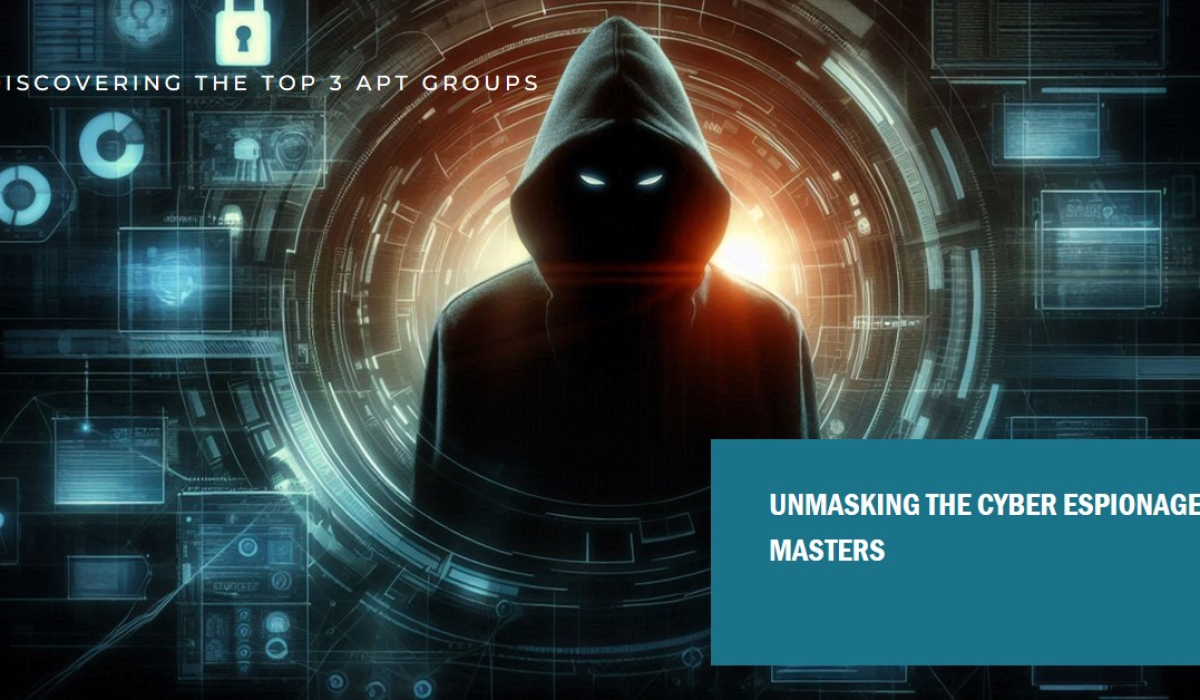Introduction
Advanced Persistent Threat (APT) groups are highly sophisticated, well-funded, and often state-sponsored cyber adversaries. Their primary goal is to gain unauthorized access to sensitive information, disrupt critical infrastructure, or conduct cyber espionage. APTs are characterized by their ability to maintain a persistent presence within a targeted network for extended periods, often undetected.
The significance of APT groups cannot be overstated. Their attacks can have far-reaching consequences, including economic loss, national security breaches, and disruptions to essential services. Understanding the tactics, techniques, and procedures (TTPs) of these groups is essential for organizations and governments to defend against their cyber threats.
In this article, we will delve into the top three APT groups, examining their origins, notable campaigns, and the impact they have had on the global cybersecurity landscape.
Fancy Bear (APT28): A Russian Cyber Espionage Master
Origin:
Fancy Bear, also known as APT28 or Sofacy, is a Russian state-sponsored cyber espionage group. It is believed to be affiliated with the Russian military intelligence agency, GRU.
Targets:
Fancy Bear has a history of targeting high-profile political figures, military organizations, and other entities of geopolitical interest to Russia. Notable targets include:
- The Democratic National Committee (DNC): The group was responsible for the 2016 hacking of the DNC, which led to the release of sensitive emails and played a significant role in the U.S. presidential election.
- World Anti-Doping Agency (WADA): Fancy Bear hacked WADA’s servers, exposing confidential medical records of athletes.
- NATO and other Western governments: The group has targeted various Western governments and military organizations, seeking to gather intelligence and disrupt their operations.
Notable Attacks:
- 2016 US Presidential Election Interference: Fancy Bear is widely believed to have been responsible for hacking the Democratic National Committee (DNC) and the campaign of Hillary Clinton. They stole sensitive emails and released them to the public, potentially influencing the election outcome.
- 2017 WannaCry Ransomware Attack: Although not directly attributed to Fancy Bear, the group is suspected of having a role in developing and distributing the WannaCry ransomware, which caused widespread disruption to businesses and healthcare organizations worldwide.
- 2018 Olympics Hacking: Fancy Bear was implicated in a cyberattack targeting the International Olympic Committee (IOC) and the Pyeongchang Winter Olympics, resulting in the data breach of athlete medical records.
Tactics and Techniques:
Fancy Bear is known for its sophisticated techniques and persistent nature. Some of its common tactics include:
- Spear phishing: The group sends targeted emails containing malicious attachments or links to trick victims into clicking on them.
- Exploit kits: Fancy Bear leverages vulnerabilities in software to gain unauthorized access to systems.
- Custom malware: The group develops and deploys custom malware to maintain a persistent presence within compromised networks.
Fancy Bear’s activities have had a significant impact on the global cybersecurity landscape, highlighting the growing threat of state-sponsored cyber espionage.
2. Lazarus Group
Origin: The Lazarus Group is a North Korean state-sponsored cybercrime group. It is believed to be linked to the North Korean government’s Reconnaissance General Bureau.
Targets: Lazarus Group primarily targets financial institutions, but they have also been known to attack critical infrastructure systems and conduct cyber espionage against governments.
Infamous Incidents:
- WannaCry Ransomware Attack: In 2017, the Lazarus Group was implicated in the global WannaCry ransomware outbreak. The attack affected hundreds of thousands of computers worldwide, causing significant disruption to businesses and healthcare organizations.
- Sony Pictures Entertainment Hack: In 2014, Lazarus Group is believed to have been behind the cyberattack on Sony Pictures Entertainment, which resulted in the theft of sensitive data and the release of confidential documents.
Focus on Financial Cyber Crimes:
Lazarus Group is notorious for its involvement in financial cybercrimes. They have been linked to numerous bank heists, cryptocurrency thefts, and other financial fraud schemes. Their goal is often to steal large sums of money, which can be used to fund the North Korean government or enrich individuals associated with the group.
Modus Operandi:
Lazarus Group employs a variety of tactics and techniques to carry out their attacks. Some of their key methods include:
- Botnets: The group often uses botnets, networks of compromised computers, to launch distributed denial-of-service (DDoS) attacks and spread malware.
- Malware Propagation: Lazarus Group develops and distributes a variety of malicious software, including ransomware, backdoors, and spyware. They often use phishing emails, malicious websites, and exploit vulnerabilities in software to infect victims’ systems.
- Social Engineering: In addition to technical attacks, Lazarus Group also relies on social engineering techniques to manipulate victims into revealing sensitive information or clicking on malicious links.
- Money Laundering: To conceal the proceeds of their crimes, Lazarus Group often engages in money laundering activities. This may involve transferring funds through complex networks of bank accounts and shell companies.
3. APT 41
Origin: APT 41, also known as Wicked Panda, is a Chinese state-sponsored cyber espionage group. It is believed to be part of the Chinese Ministry of State Security.
Targets: APT 41 is a versatile group that targets a wide range of industries, including technology, telecommunications, healthcare, and finance. Their objectives include both cyber espionage and financial gain.
Combining Cyber Espionage with Financially Motivated Attacks:
One of the distinguishing features of APT 41 is its ability to combine cyber espionage with financially motivated attacks. This hybrid approach allows them to achieve multiple objectives simultaneously, making it difficult for defenders to detect and respond.
- Espionage Campaigns: APT 41 has been involved in numerous espionage campaigns targeting sensitive government and corporate information. They have stolen intellectual property, trade secrets, and classified documents from a variety of organizations.
- Financial Crimes: In addition to espionage, APT 41 has also been implicated in financial crimes, such as bank heists and cryptocurrency thefts. They have used their advanced cyber capabilities to target financial institutions and steal large sums of money.
Wide-Ranging Campaigns:
APT 41 has conducted numerous campaigns targeting victims worldwide. Some of their notable activities include:
- Targeting the US Healthcare Sector: APT 41 has been known to target the US healthcare sector, stealing patient data and compromising medical devices.
- Attacking Telecommunications Companies: The group has also attacked telecommunications companies, gaining access to sensitive customer data and network infrastructure.
- Targeting Technology Companies: APT 41 has targeted technology companies to steal intellectual property and gain access to proprietary software.
Attribution Challenges:
Attributing cyberattacks to specific APT groups can be challenging, and APT 41 is no exception. The group often employs sophisticated techniques to cover their tracks and make it difficult to definitively link their activities to the Chinese government. However, the evidence gathered by cybersecurity researchers and intelligence agencies strongly suggests that APT 41 is a Chinese state-sponsored actor.
Conclusion
APT groups pose a significant threat to the global cybersecurity landscape. Their sophisticated attacks can have far-reaching consequences, including economic loss, national security breaches, and disruptions to critical infrastructure. Understanding the tactics, techniques, and procedures of these groups is essential for organizations and governments to defend against their cyber threats.
To effectively counter APT groups, robust defenses are crucial. Organizations should invest in advanced security technologies, implement strong access controls, and regularly update their systems and software. Additionally, international cooperation is essential for sharing intelligence and developing collective responses to these global threats.
As the cyber threat landscape continues to evolve, it is imperative for individuals and organizations to stay informed about the latest cybersecurity developments. By staying vigilant and adopting best practices, we can help protect ourselves and our communities from the devastating consequences of APT attacks.





